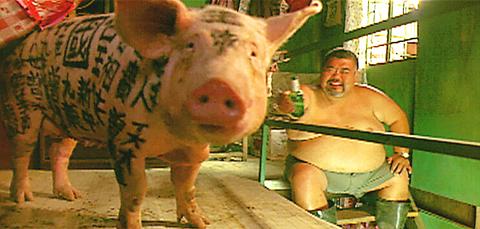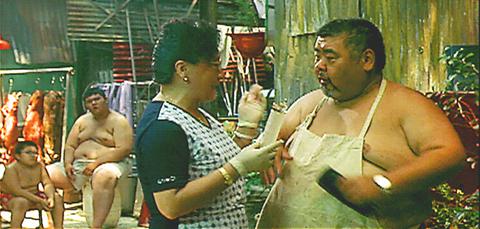It would not be inappropriate to describe Fruit Chan as one of Hong Kong's most insightful filmmakers in his efforts to portray contemporary Hong Kong society post hand-over. From 1997's Made In Hong Kong, a cutting look at a young man's dysfunctional family and Hong Kong's twisted materialism, to Durian Durian, about a prostitute from northern China who is seeking her fortune in Hong Kong, Chan -- who always writes his own stories -- expresses his poignant observation in the scripts and then realizes these stories with an explosive cinematic rhythm.
Hollywood Hong Kong is Chan's fifth work, and the second volume of his "Prostitute Trilogy."
After four films emphasizing realistic images of the streets and back alleys of Hong Kong, using non-professional actors to underscore the atmosphere of realism, Hollywood Hong Kong sees a shift in Fruit Chan's filmmaking style. It is his most dramatic film and perhaps his most meticulously designed film to date, and it employs a star-studded cast.

PHOTO COURTESY OF GROUP POWER
The film starts out with some very symbolic imagery. Fat pigs, pork, three obese men and a whole pig being barbecued and covered with bright red sauce.
This vermillion scene is the Chu family's home in Ta-hom village, an impoverished Hong Kong neighborhood, with dozens of wooden houses cramped into a small area. This place was, in real life, Hong Kong's last shantytown; it was only demolished recently. An obese man (Glen Chin) and his two equally fat sons run a barbecue pork shop in the village. Facing their shabby house is a luxury apartment block, ironically named Hollywood.
A beautiful young lady from Shanghai Tung Tung (Zhou Xun) moves into the apartment block. She immediately gets to work seducing the three by frequenting their shop. Wearing a red dress, she likes to play swing in the small house. And she tells the youngest son, "Although I live in Hollywood, my dream is to go to the real Hollywood."

PHOTO COURTESY OF GROUP POWER
Meanwhile, Chu's neighbor, a young man who likes to look for one-night stands on the Internet, also becomes involved with Tong Tong, who goes by the alias "Shanghai babe" on the Web.
Fruit Chan has abandoned his usual realism to make this film, and it shows both in his cinematography as well as in his script. Instead, he focuses on presenting the dreams of people in Hong Kong -- sexual fantasies for the Chu family and Tung Tung's dreams of a more colorful world outside Hong Kong.
As the pace picks up, the various faces of this femme fatale are unveiled. Gangsters start to threaten the men, and some of them even get a hand chopped off. At the climax of the story, one sees Fruit Chan's bold and fluid camerawork, when the men, cheated of love and money, run atop the roofs of the shantytown in search of the woman who has conned them all.
For audiences from Hong Kong or Taiwan, Hollywood Hong Kong might seem like a very ironic take on a relationship between a man from Hong Kong and a woman from the mainland. Before, it was men from Hong Kong who had mistresses in China. Now, as Fruit Chan seems to be warning us, it's the Shanghai babes who are invading Hong Kong.
In a way, this shift of style in Hollywood Hong Kong is successful for Chan, and it shows in the solid production of key elements such as sound, editing and cinematography. The actors also performed well. But most importantly, Chan is making a smart move -- breaking out of his old style so as not to be stereotyped, and focusing his black humor in a new direction. The result is a cinematic aphorism about a sexually anxious Hong Kong.
Hollywood
Hong Kong
Directed by: Fruit Chan
Starring: Zhou Xun (周迅), Glen Chin (陳英明), Wong You-nam (黃永南)
Running time: 102 minutes
Taiwan Release: tomorrow

April 28 to May 4 During the Japanese colonial era, a city’s “first” high school typically served Japanese students, while Taiwanese attended the “second” high school. Only in Taichung was this reversed. That’s because when Taichung First High School opened its doors on May 1, 1915 to serve Taiwanese students who were previously barred from secondary education, it was the only high school in town. Former principal Hideo Azukisawa threatened to quit when the government in 1922 attempted to transfer the “first” designation to a new local high school for Japanese students, leading to this unusual situation. Prior to the Taichung First

The Ministry of Education last month proposed a nationwide ban on mobile devices in schools, aiming to curb concerns over student phone addiction. Under the revised regulation, which will take effect in August, teachers and schools will be required to collect mobile devices — including phones, laptops and wearables devices — for safekeeping during school hours, unless they are being used for educational purposes. For Chang Fong-ching (張鳳琴), the ban will have a positive impact. “It’s a good move,” says the professor in the department of

On April 17, Chinese Nationalist Party (KMT) Chairman Eric Chu (朱立倫) launched a bold campaign to revive and revitalize the KMT base by calling for an impromptu rally at the Taipei prosecutor’s offices to protest recent arrests of KMT recall campaigners over allegations of forgery and fraud involving signatures of dead voters. The protest had no time to apply for permits and was illegal, but that played into the sense of opposition grievance at alleged weaponization of the judiciary by the Democratic Progressive Party (DPP) to “annihilate” the opposition parties. Blamed for faltering recall campaigns and faced with a KMT chair

Article 2 of the Additional Articles of the Constitution of the Republic of China (中華民國憲法增修條文) stipulates that upon a vote of no confidence in the premier, the president can dissolve the legislature within 10 days. If the legislature is dissolved, a new legislative election must be held within 60 days, and the legislators’ terms will then be reckoned from that election. Two weeks ago Taipei Mayor Chiang Wan-an (蔣萬安) of the Chinese Nationalist Party (KMT) proposed that the legislature hold a vote of no confidence in the premier and dare the president to dissolve the legislature. The legislature is currently controlled